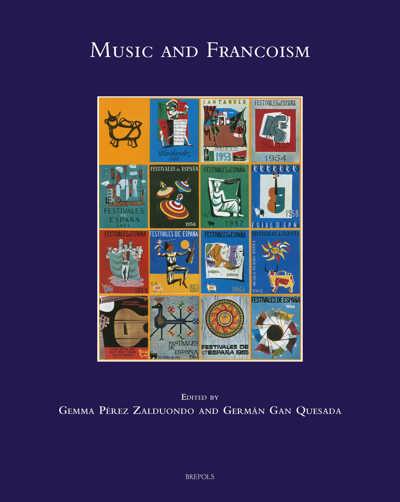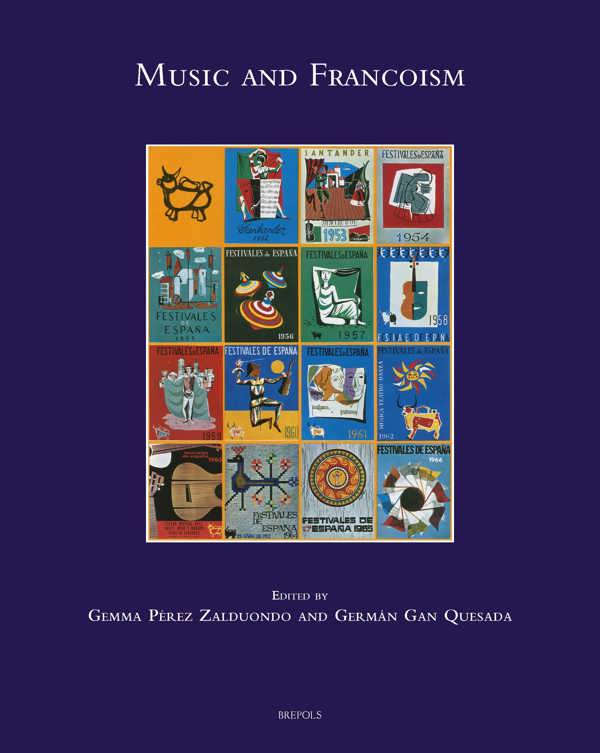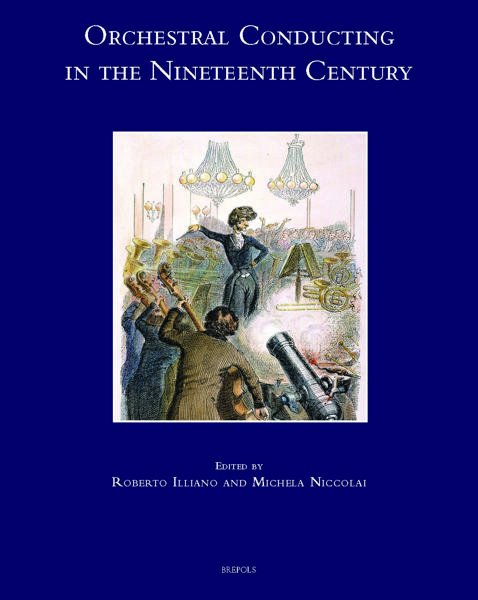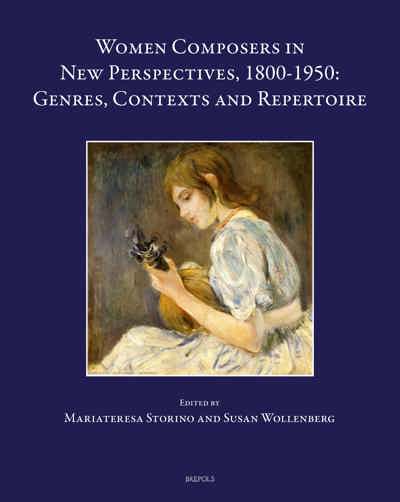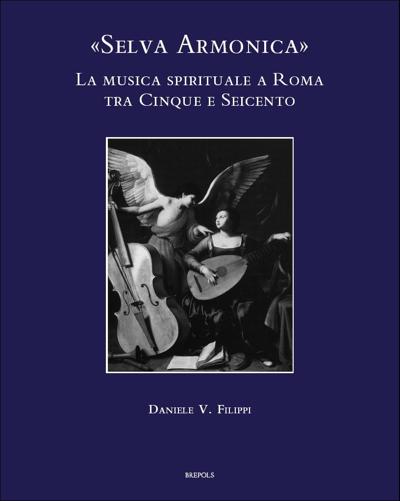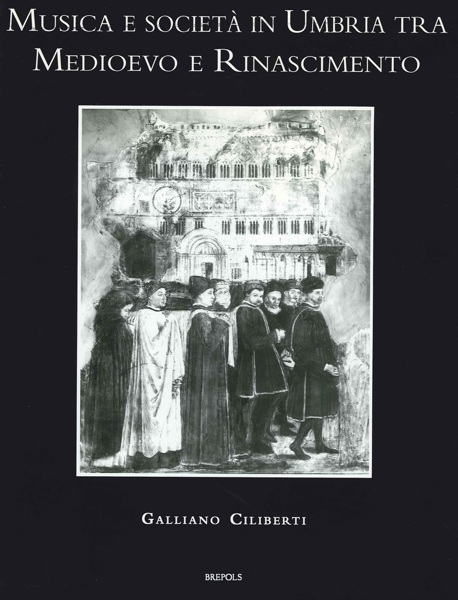
Music and Francoism
Gemma Pérez Zalduondo, Germán Gan Quesada (eds)
- Pages: 488 p.
- Size:210 x 270 mm
- Illustrations:50 b/w
- Language(s):English, Spanish, German
- Publication Year:2014
- € 130,00 EXCL. VAT RETAIL PRICE
- ISBN: 978-2-503-54899-9
- Hardback
- Available
"On connaît bien désormais le sérieux des contenus et le soin apporté à la présentation – on peut même parler de luxe, tant le papier, la couverture cartonnée et toilée sont de qualité – des ouvrages de la série Speculum Musicae des éditions Brepols, série dirigée de main de maître par Roberto Illiano du très actif Centro Studi Opera Omnia Luigi Boccherini.(...) Music and Francoism devient incontestablement l’ouvrage de référence sur lequel devra se fonder toute nouvelle recherche portant sur cette thématique précise et, plus largement, sur les rapports du pouvoir politique et de la musique au xxe siècle." (Stéphan Etcharry, dans: Revue de musicologie, 101.1, 2015, p. 259-264)
“Este libro se erige ya en hito internacional y referencia inexcusable sobre los vínculos entre música y franquismo, así como en un magnífico punto de partida para congratularnos por todo lo que se ha desgranado e ilusionarnos con lo que está por hacer.” (Iván Iglesias, in Revista de Musicología, XL/1, 2017, p. 266)
This book brings together 19 essays by musicologists of different nationalities and offers studies conducted within today’s most active research lines within the field of musicology. The contributions refer to the analysis of networks of relationships that musical activities and phenomena had developed with the Franco regime (1938-1975). These offer approaches to specific genres (chamber music, instrumental and theatrical music, flamenco, jazz, copla, light music, and cinematic music) and to diverse repertories and creative musical languages (nationalist, Neoclassical, and avant-garde) without neglecting the study of the creation, musical discourse, and its producers (composers, performers, and critics) within the domain of public and private institutional frameworks. Also, they investigate the musical policies that formed part of the regime and involved repertories, creators, and performers. In this regard, the chapters that study music in the context of international relations up to the end of the Second World War stand out, as do those that investigate the impact that historical events such as the Spanish Civil War. Others specifically examine musical influences exerted beyond the Spanish borders on foreign composers and their contexts as well as on Spanish composers in exile. This volume presents a critical synthesis of the historiographic reflection that to date has dealt with the relations of music with the Franco regime, together with an analysis of the theoretic-artistic and identity-defining speeches in force during early Francoism, with an evaluation of their precedents.
Foreword
Musical Exchanges in Europe at War:
Erik Levi, The Reception of Spanish Music in Germany during the Nazi Era – Igor Contreras Zubillaga & Manuel Deniz Silva, « Obligados a convivir pared con pared ». Los intercambios musicales entre España y Portugal durante los primeros años del franquismo (1939-1944) – ]avier Suárez-Pajares, Festivals and Orchestras. Nazi Musical Propaganda in Spain during the Early 1940s
Institutions and Political Practices:
Beatriz Martínez Del Fresno, Women, Land, and Nation: The Dances of the Falange's Women's Section in the Political Map of Franco's Spain (1939-1952) – Itziar Larrinaga Cuadra, Dura lex, sed lex. La depuración franquista en las instituciones musicales dependientes del Ayuntamiento de Donostia-San Sebastián (1936-1940) – Xosé Aviñoa, Musical Institutions in Catalonia in Francoist Spain – Gemma Pérez Zalduondo, « Que nada aparezca en la calle que resulte ajeno [ ... ] a los intereses del estado »: La música en el Ministerio de Información y Turismo (1951-1956) – Marta Cureses, The Institutionalization of the Avant-Garde in Catalonia as of 1939
Sociopolitical Implications of Popular Music:
Pilar Ramos López, Beyond Francoist Propaganda and Current Nostalgia: Some Remarks on Coplas – Julio Arce, Castanets and White Telephones: (Musical) Comedies during the Early Years of the Franco Regime – Pedro Ordóñez Eslava, Qualities of Flamenco in the Francoism: Between the Renaissance and the Conscience of Protest – Daniel Party, Raphael Is Different: Spanish Canción Melódica under Late Francoism
Specific Studies:
María Isabel Cabrera García, Europe in the Creation of the Aesthetic Ideology of the Francoism before the Civil War – Luis Velasco Pufleau, The Spanish Civil War in the Work of Silvestre Revueltas – Walter Aaron Clark & William Craig Krause, Federico Moreno Torroba's Monte Carmelo and Cultural Politics under Franco during the I 940s – Carol A. Hess, Anti-Fascism by Another Name: Gustavo Durán, the Good Neighbor Policy, and Franquismo in the United States – Michael Christoforidis, Manuel de Falla’s Atlántida and the Politics of Spain: From Conception to First Performance – Francisco José Fernández Vicedo, Spanish Music and Wind Instruments: Stylistic Changes in Chamber Music for Clarinet (1950-1965) – Christiane Heine, Zwölftonkomposition im Nachkriegsspanien am Beispiel von Gerardo Gombaus Música 3+1 für Streichquartett (1967)
Biographies
Index of Names
